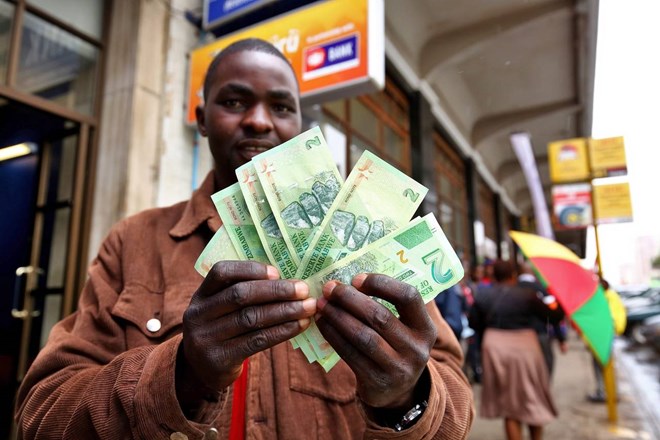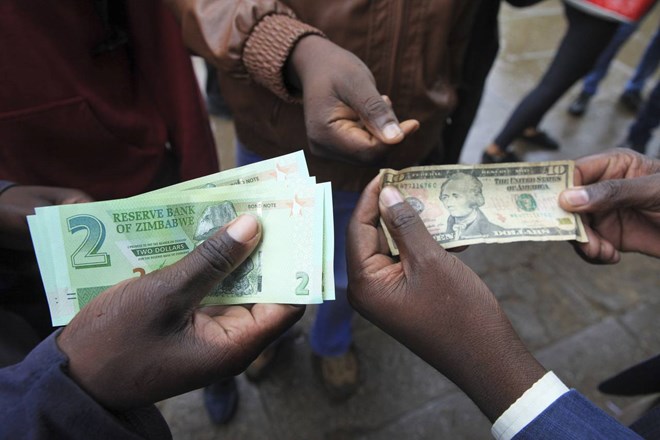
Tuesday, November 29, 2016
Scramble for dollars was compounded Monday when the central bank started issuing a parallel currency

A man holds newly issued bond notes in Harare, Zimbabwe, on Monday. The Reserve Bank of Zimbabwe has introduced bond notes to ease cash shortages. PHOTO: AARON UFUMELI/EUROPEAN PRESSPHOTO AGENCY
In Zimbabwe, a U.S. dollar is no longer worth a U.S. dollar.
Money changers charge $102 in small notes for a $100 bill. Workers withdraw their salary by paying other people’s groceries at the supermarket—often receiving less cash than the charge on their card. Online buy-and-sell groups trade large amounts of cash for bank transfers at a 12% premium.
The devaluation—and simultaneous appreciation—of the U.S. currency against itself is one of the more peculiar consequences of Zimbabwe’s worst economic crisis in years.
The Southern African country started using the U.S. dollar in 2009, hoping it would bring stability after years of hyperinflation that added 12 zeros to its currency. But now, with exports collapsing and cash fleeing the country, the greenback has become a scarce commodity.
As people fear the repressive government of President Robert Mugabe may soon revive its own currency, U.S. dollars in the bank are suddenly worth less than in cash. Those fears were heightened on Monday, when the central bank started issuing $10 million in so-called bond notes, a parallel currency which the government insists is only a temporary measure and will be pegged 1:1 to the U.S. dollar.
Anxious Zimbabweans have started hoarding dollars or taking them out of the country, sending the value of the remaining greenbacks still higher. Rare, high-denomination bills, such as the $100, can reap a special premium.
“It’s an utterly bizarre situation,” said Charles Laurie, a Zimbabwean economist who is head of political risk at Verisk Maplecroft. “There’s a growing sense of being alienated from your money.”
Zimbabwe’s government is trying to get a grip. Banks have limited daily withdrawals to as little as $20 and account holders trying to get cash are often told that there isn’t any. Hundreds of Zimbabweans have been sleeping in front of their banks, striving to be first in line when doors open at 8 a.m.
In the third week of November, ATM withdrawals crashed to $20.7 million, down from $79.1 million a week at the beginning of the year, according to the central bank. The central bank has also curtailed the distribution of $50 and $100 bills, which it says are being used to smuggle money out of the country.
This mismatch of supply and demand has translated into varying, and unprecedented, dollar-to-dollar exchange rates.
On a recent Monday night, Blessing, a cellphone trader, approached King, one of around 50 money changers working in Harare’s upscale Eastgate Mall. Like other Zimbabweans quoted in this story, the two men asked that their last names not be published, because the dollar-for-dollar trades are illegal.
“I want $50s and $100s,” said Blessing, gripping a small bag that held several weeks’ worth of earnings. Like countless other cross-border traders, Blessing buys his goods in bulk from Asian salesmen in South Africa, who demand high-denomination notes, and peddles them in Zimbabwe for a higher price.
That night, the going rate for $100 bill was $102, King told Blessing. “You won’t find a better rate this time of the month,” he said, thumbing wads of crisp $100 and $50 notes.
After haggling, the men settled on a rate of $101.50 for $100. Blessing handed over $1,015 in tattered $5, $10 and $20 bills and received $1,000 in return, before boarding an overnight bus to Johannesburg.
Elsewhere, you get even fewer bucks for your buck.

Zimbabweans compare the newly issued bond notes with the U.S. dollar note in Harare on Monday. PHOTO: TSVANGIRAYI MUKWAZHI/ASSOCIATED PRESS
At the OK Supermarket in Harare’s Avenues district, Trevor, a construction worker, hovered over customers queuing to pay their groceries. His boss had transferred $400, his monthly salary, to his bank account and Trevor urgently needed cash to pay his rent.
Rather than lining up for hours at a bank and risk getting nothing, Trevor had another plan: Find a shopper with cash, pay by card for that person’s groceries and receive the money in return.
“This is my second month doing this and it’s painful,” said Trevor, adding that he often ends up getting less cash than the charge on his card.
Exchange-rate mismatches aren’t unusual. Black-market dollar rates can often be more expensive than official rates, usually because the central bank pegs the currency at a level the market doesn’t trust. Capital controls can also lead to a devaluation of deposits compared with cash.
But nowhere has the phenomenon of varying exchange rates within the same currency afflicted the U.S. dollar to the extent that it is happening in Zimbabwe.
Discounted dollar-for-dollar trades have become so common that the central bank in October banned businesses from accepting card payments made by someone other than the customer completing the purchase. The bank said it is also working with police to crack down on currency traders selling high-denomination bills. “Such practices are not only illegal, but also have negative effects on the economy,” it warned.
In some instances, the dollar-for-dollar swaps turn into profiteering.
In a buy-and-sell group on WhatsApp, a man who identified himself as Shingie, made an expensive proposition. “I have $3,500 cash, which I’m exchanging for anyone who transfers $3,500 plus a 12% premium to my Standard Chartered account,” the message read. Reached by phone, the man declined to say whether anyone had paid him $3,920 for $3,500.
The bond notes that are now being issued will likely drive up the cost of cash dollars.
“My fear is that bond notes could make this worse,” said Trevor, the construction worker.
Write to Gabriele Steinhauser at [email protected]